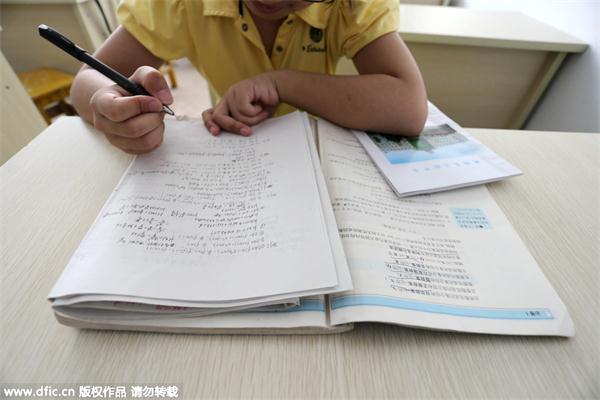Let kids enjoy and learn from life during vacations
Updated: 2015-07-17 08:39
By Liu Xiuying(China Daily)
|
|||||||||
 |
|
A girl student does her homework at a training class. [Photo/IC] |
The thought of summer vacation thrills students. But for parents, it could be a source of worry. One of the main concerns of parents is whether their children should attend special classes during vacations. This decision, however, should not depend only on parents or students.
Summer and winter vacations, according to educator and sociologist Pan Guangdan, should be used to gather knowledge, not to rest. But the way of gathering knowledge should be different. Pan says the greatest drawback of schools is their excessive emphasis on textbooks, because it deprives students of the opportunity to learn independent of books. Vacations fortunately provide that opportunity.
Indeed, summer and winter holidays are meant to help students' healthy development. More often than not, students lose their individuality in rote learning in schools. To impart education, schools follow a daily routine based on a standardized teaching method. But that cannot cater to students' special needs, especially if they have above or below average comprehension capability.
School students hardly get enough free time during the day to learn from and enjoy life. Moreover, many elementary and middle school students have to spend weekends attending extracurricular classes. Such classes do help them to learn from books but they also rob them of the chance to learn from the other aspects of life.
Children and adolescents are much more enthusiastic than adults, and love to encounter the unknown, be it the different facets of mother nature, the true meaning of love and friendship, the biological changes they experience in their bodies or the good and bad sides of the world. During vacations they can more easily have such encounters, which ultimately can help them become better human beings.
Once parents realize vacations offer a different way of learning for their children, they will have less difficulty in making arrangements for their children. But no matter what they do, they should never force their children to spend all their time poring over more books, because that would mean moving the classroom from school to home. This is not to say that children should not touch books during holidays; students have to revise and review whatever they have learned in the past term, for which they are assigned homework. This is only to say that parents should not burden their children with more books.
Extracurricular classes could be part of children's vacation schedule. But parents should weigh their children's performance in school before deciding which course they should join. Perhaps a different teacher or learning method can help a student better understand the subjects he/she was having trouble with in class.
If possible, parents should send their children to stay with their grandparents in another city or rural area for a couple of weeks. This will help them develop respect and love for aged people, as well as experience another lifestyle and environment.
Parents could send their children to summer camps, too, where they can learn how to act both independently and in groups. Summer camps can also help them learn how to live with a team and make new friends, which is an important aspect of life. Besides, by sending their children to summer camps, parents who have spent all their time attending to the needs of their children will get some much-needed free time to relax.
Visiting museums and exhibitions are always a great learning experience for children. Hitting the gym or playing outdoor sports is a source of relief as well as joy. Cooking or learning to cook is another stress buster. In short, vacations should be full of diverse activities, because only through them can children learn the true meaning of life.
The author is director of the family research center at China Youth & Children Research Center.
Related Stories
Students need more say in picking uniforms 2015-07-16 07:58
Taiwan teachers and students explore Yunnan 2015-07-16 17:37
Students pose against hate in selfie campaign 2015-07-13 07:37
Students study depression to raise suicide awareness 2015-07-10 10:54
Today's Top News
Inspectors to cover all of military
Britons embrace 'Super Thursday' elections
Campaign spreads Chinese cooking in the UK
Trump to aim all guns at Hillary Clinton
Labour set to take London after bitter campaign
Labour candidate favourite for London mayor
Fossil footprints bring dinosaurs to life
Buffett optimistic on China's economic transition
Hot Topics
Lunar probe , China growth forecasts, Emission rules get tougher, China seen through 'colored lens', International board,
Editor's Picks

|

|

|

|

|

|







